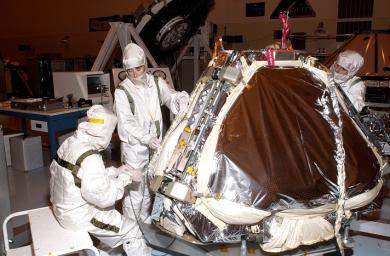
|
Air Bag Installation
- Click the image above for a larger view
- Full-Res JPEG (3000 x 1968) (1.0 MB)
- Full-Res TIFF (3000 x 1968) (17.7 MB)
Caption:
May 10, 2003
Prelaunch at Kennedy Space Center
On Mars Exploration Rover 1 (MER-1) , air bags are installed on the lander. The airbags will inflate to cushion the landing of the spacecraft on the surface of Mars. When it stops bouncing and rolling, the airbags will deflate and retract, the petals will open to bring the lander to an upright position, and the rover will be exposed. NASA's twin Mars Exploration Rovers are designed to study the history of water on Mars. These robotic geologists are equipped with a robotic arm, a drilling tool, three spectrometers, and four pairs of cameras that allow them to have a human-like, 3D view of the terrain. Each rover could travel as far as 100 meters in one day to act as Mars scientists' eyes and hands, exploring an environment where humans can't yet go. MER-1 is scheduled to launch June 25 as MER-B aboard a Delta II rocket from Cape Canaveral Air Force Station.
Cataloging Keywords:
| Name | Value | Additional Values |
|---|---|---|
| Target | Mars | |
| System | ||
| Target Type | Planet | |
| Mission | Mars Exploration Rover (MER) | |
| Instrument Host | Opportunity (MER-B) | |
| Host Type | Rover | |
| Instrument | ||
| Detector | ||
| Extra Keywords | Color, Water | |
| Acquisition Date | ||
| Release Date | 2003-11-07 | |
| Date in Caption | 2003-05-10 | |
| Image Credit | NASA/JPL/KSC | |
| Source | photojournal.jpl.nasa.gov/catalog/PIA04852 | |
| Identifier | PIA04852 | |
